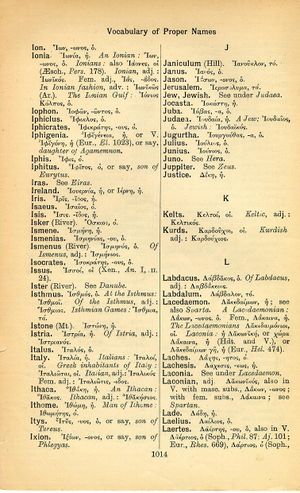Iphigenia
ὥσπερ λίθοι τε καὶ πλίνθοι καὶ ξύλα καὶ κέραμος, ἀτάκτως μὲν ἐρριμμένα οὐδὲν χρήσιμά ἐστιν → just as stones and bricks, woodwork and tiles, tumbled together in a heap are of no use at all (Xenophon, Memorabilia 3.1.7)
English > Greek (Woodhouse)
Ἰφιγένεια, ἡ, or V. Ἰφιγόνη, ἡ (Eur., El. 1023), or say, daughter of Agamemnon.
Latin > English (Lewis & Short)
Īphĭgĕnīa: ae (Gr. acc. Iphigenian, Ov. P. 3, 2, 62), f., = Ἰφιγένεια,>
I Iphigenīa, a daughter of Agamemnon and Clytemnestra, who, because her father had killed, in Aulis, a hart belonging to Diana, was to be offered up by way of expiation; but the goddess put a hart in her place and conveyed her to the Tauric Chersonese, where she became a priestess of Diana, and with her brother Orestes carried off Diana's image, Ov. M. 12, 27 sq.; Hyg. Fab. 98 and 120; Cic. Tusc. 1, 48, 146; Prop. 3, 7 (4, 6), 24; Juv. 12, 119.

